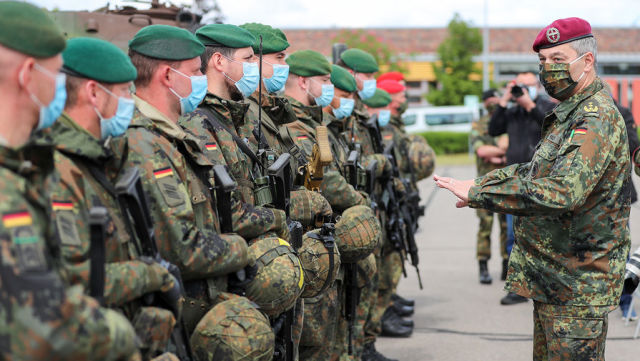General of the Bundeswehr likened the threat to NATO from Russia and China
Russia was once again considered the main threat to NATO. This time such a statement was made by the General of the Bundeswehr. He spoke about the Alliance forces stationed in Poland and the Baltic States, aimed at deterring the Russian Federation. At the beginning of the month, the military-political bloc called Russia the main threat to itself for the next ten years. Russian defense Minister Sergei Shoigu noted that against the background of such statements, the Alliance is strengthening its presence at the country's borders.
General of the Bundeswehr and chief of staff of the United States army in Wiesbaden Jared Sembritzki in an interview with Frankfurter Allgemeine Zeitung said that NATO turned to the East because of the "Russian threat". He noted that the situation in Eastern Europe was unstable even before the situation with Crimea.
Asked if Russia could be called the main threat, he said: "Definitely." "The Russian threat is real. Russia continues to arm itself, massively modernizing its armed forces and increasingly demonstrating its desire for power. Russian tanks are a reality, as are missiles and planes, " the military said.
"But we as a military cannot resist it. And China is quite far from us geographically, " he explained.
Zembritzki said that in Poland and in three other Baltic countries there are four combat groups of the North Atlantic Alliance, designed to counter the Russian threat. The military-political bloc in Europe also has powerful forces that are preparing for possible crises, he noted. This is what the military called a real deterrent force for the Russians.
In early December, in a report on the reform of the NATO - 2030 Alliance, which was published following consultations of the Alliance's foreign Ministers, Russia was called the main military threat to NATO until at least 2030. According to the report, the Alliance is going to strengthen its capabilities to deter Moscow, while continuing the dialogue on peaceful coexistence on the basis of the NATO-Russia Council. As indicated in the document, NATO is ready to conduct a dialogue only from a position of strength.
The document notes that NATO is going to closely monitor cooperation between Moscow and Beijing, especially in the military-technical sphere.
"Although China does not pose an immediate military threat to the Alliance on the same scale as Russia, it is expanding its military capabilities in the Mediterranean sea, the Atlantic ocean and the Arctic, as well as deepening defense cooperation with Russia," the report stated.
The head of the international Committee of the Federation Council Konstantin Kosachev, commenting on this document, said that statements about" threats " to NATO from the Russian Federation and other States are necessary to overcome differences within the military-political bloc itself. "External" scarecrows "are needed primarily to overcome tensions within the Alliance and in General to try to restore a sense of cheerfulness to the body with a "dead brain", Recalling the expression of [French President Emmanuel] Macron, " the Senator wrote on Facebook.
As Russian defense Minister General of the army Sergei Shoigu said at an expanded meeting of the Board of the military Department, NATO considers Moscow its main threat and against this background is increasing its military potential near the Russian borders. "In 2020, the geography of challenges for our country has expanded, the role of military force in solving international problems has increased. NATO sees Russia as its main threat and is building up its military potential near our borders," the Minister said.
Shoigu drew attention to the fact that the United States is conducting systematic actions to build up its military force near Russia. Washington, in particular, organized the redeployment of combat units from Germany to Poland and the Baltic States, the Russian Minister noted. In addition, according to him, the advanced presence of American ships in the Arctic region is being increased.
"NATO training exercises conducted simultaneously at the Western, southern and Eastern borders of Russia have become systematic. In August and September alone, 55 combat aircraft, including strategic bombers and 12 precision weapons carrier ships, participated in them," the Minister said. He assured that the Russian armed forces closely monitored these and other exercises and took mirror measures.
Kristina Sizova

